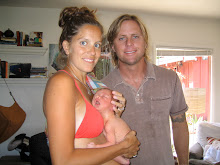Here's the post:
Saturday, September 05, 2009
Don't Move On
When you're grieving, well-intended people sometimes say, "It's time to move on." And if you get stuck in the early phase of grief where every single thing you do -- eat, sleep, dress, talk -- relates directly to your loss, people might say behind your back, "She really needs to move on."
The very notion of moving on has made me fear I'm grieving incorrectly -- I'm stuck, depressed, or insane. But today, six years since my triplets died, I can finally say with confidence that I'm not moving on. When an intimate dies, it's up to you to respond in your own way. If you need to move on, maybe because the person or their dysfunction tormented you, then you're finally free to enjoy this world without them. But if you weren't ready for them to leave, then you can keep them close.
Theologian William Spencer writes in this month's Christians for Biblical Equality newsletter about his mother. As her Alzheimer's progressed, a physician asked her how many children she had, as a memory test. She added one to the usual number, but it wasn't due to memory loss. Bill learned she had a stillborn baby, and never spoke of the baby even to its siblings. Another friend of mine said that, as her mother was dying, she spoke most often of her baby who had died sixty years earlier. She was eager to finally get to hold that baby.
You don't have to move on; you can move with. As I'm sure many of you do, I have a small collection of dearly departed friends and family who move with me in this life. They each offer something different to me - hope, love, courage, and joy. May they rest, and may we move, in peace.
When you're grieving, well-intended people sometimes say, "It's time to move on." And if you get stuck in the early phase of grief where every single thing you do -- eat, sleep, dress, talk -- relates directly to your loss, people might say behind your back, "She really needs to move on."
The very notion of moving on has made me fear I'm grieving incorrectly -- I'm stuck, depressed, or insane. But today, six years since my triplets died, I can finally say with confidence that I'm not moving on. When an intimate dies, it's up to you to respond in your own way. If you need to move on, maybe because the person or their dysfunction tormented you, then you're finally free to enjoy this world without them. But if you weren't ready for them to leave, then you can keep them close.
Theologian William Spencer writes in this month's Christians for Biblical Equality newsletter about his mother. As her Alzheimer's progressed, a physician asked her how many children she had, as a memory test. She added one to the usual number, but it wasn't due to memory loss. Bill learned she had a stillborn baby, and never spoke of the baby even to its siblings. Another friend of mine said that, as her mother was dying, she spoke most often of her baby who had died sixty years earlier. She was eager to finally get to hold that baby.
You don't have to move on; you can move with. As I'm sure many of you do, I have a small collection of dearly departed friends and family who move with me in this life. They each offer something different to me - hope, love, courage, and joy. May they rest, and may we move, in peace.
// posted by Jenell Williams Paris @ 1:08 PM 4 comments





No comments:
Post a Comment